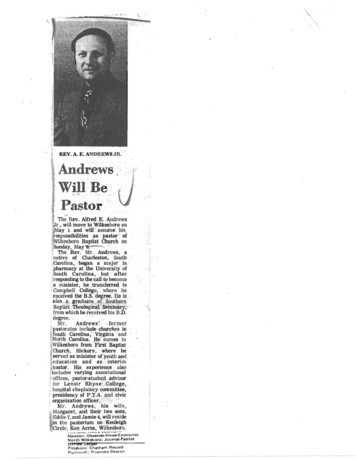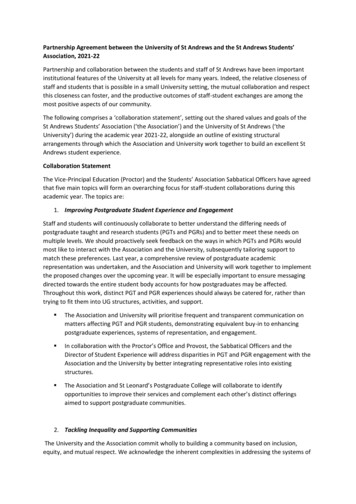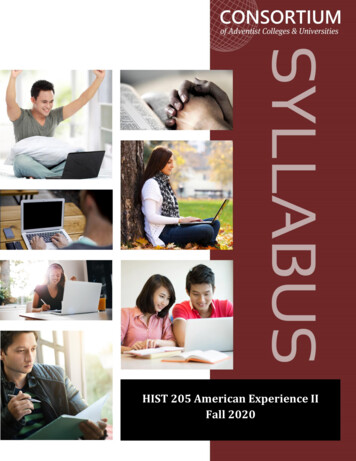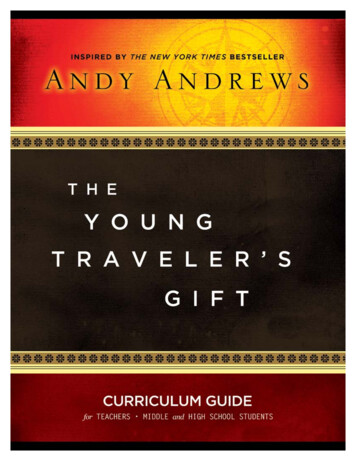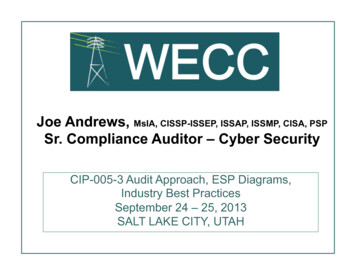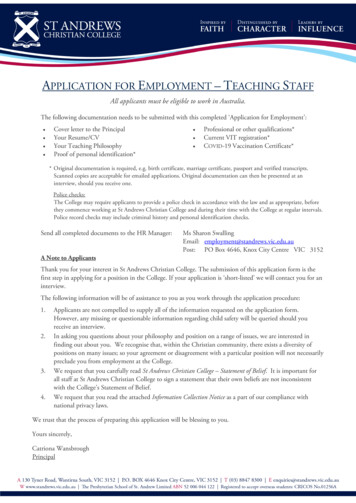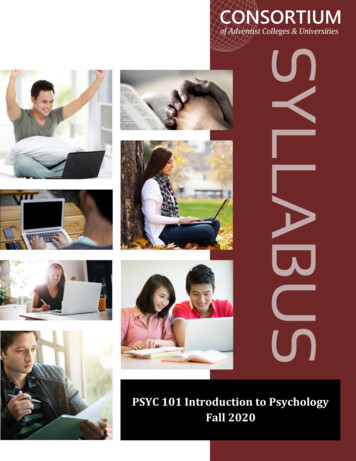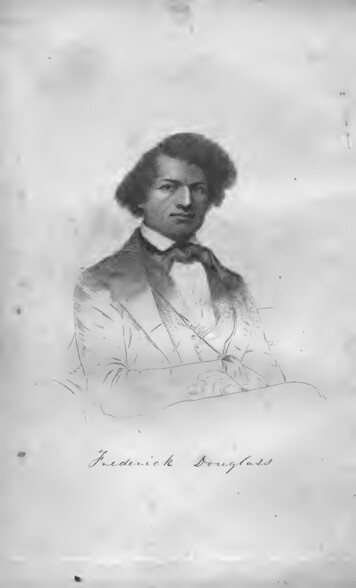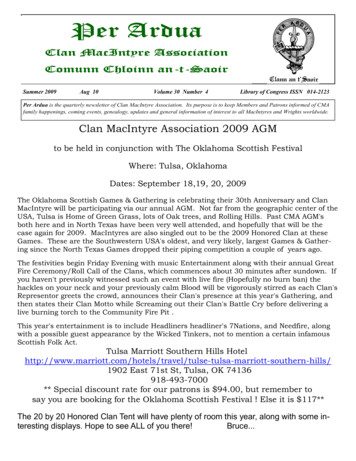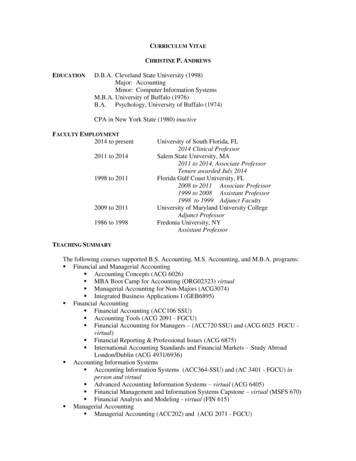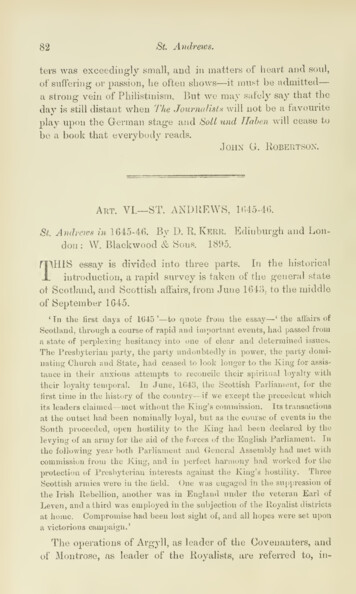
Transcription
82St.terswas exceedinglysmall,Andrews.andinmatters of heart and soul,it must be admitted——of suffering or passion, be often showsa strong vein of Philistmisra. But wemaysafely say that thenot be a favouriteday is still distant when Thewill cease toplay upon the German stage and Soil und Hahenbe a book that everybody reads.John G. Robertson.Journalists willArt.St.VI.— ST. ANDREWS,1(145-4(3.Andrews in 1645-46. By D. R. Kerr. Edinburgh and London W. Blackwood & Sons. 1895.:ri HIS essayisdivided into three parts.In the historicalXintroduction, a rapid survey is taken of the general stateof Scotland, and Scottish affairs, from June 1643, to the middleSeptember 1645.of'In thefirstdays of 1G45'—toquote from the essay—'the affairs ofScotland, through a course of rapid and important events, had passed froma state of perplexing hesitancy into one of clear and determined issues.domiparty, the party undoubtedly in power, the partynating Church and State, had ceased to look longer to the King for assistance in their anxious attempts to reconcile their spiritual loyalty withThe PresbyterianIn June, 1643, tlie Scottish Parliament, for thetheir loyalty temporal.if we except the precedent whichfirst time in the history of the countryitsleaders claimed—— met without the King's commission.Its transactionshad been nominally loyal, but as the cunrse of events in theSouth proceeded, open hostility to the King had been declared by thelevying of an army for the aid of the forces of the English Parliament. Inthe following year both Parliament and General Assembly had met withcommission from the King, and in perfect harmony had worked for theThreeprotection of Presbyterian interests against the King's hostility.at the outsetOne was engaged in the suppression ofScottish armies were in the field.the Irish Rebellion, another was in England under the veteran Earl ofLeven, and a third was employed in the subjection of the Royalist districtsat home.Compromise had been lost sight of, and all hopes were set upona victorious campaign.'The operations of Argj l, as leader of the Covenanters, andof Montrose, as leader of the Royalists, are referred to, in-
aS .83Aiidreios.eluding the battles of Tibbermiiir, Kilsyth, and Ttiverloehy, andterminating with the defeat of Montrose at Philiphangh, byLientenant-General David Leslie, on the loth Septembei',—a defeat as disastrous to tlie Royalists of Scotland, as1645,that at Naseby, in June of the same year, was to the RoyalistsinEngland.In the second part of the essay, a sketch of the ecclesiastical,municipal, and ordinary life of the city of St. Andrews is given— a considerable portion being devoted to incidents coimectedwith the University, which, Mr. Kerr justly states, 'was the chiefglory of the city.' Reference is made to Rutherford, who wasone of the most distinguished of the Professors, and to RobertafterBlair, minister of the first charge in the town, andRutherford, probably the most notable man connected withthe city.' Rutherford was one of the Commissioners from theGeneral Assembly of the Church of Scotland to the West'minster Assembly of Divines.'Inmanymennotablerespects,' says Mr. Kerr, 'Rutherford was one of the mostof his time.His eloquence, courage, and sufferings fur thecause of Presbyterianisni had raised him to the position of a leader of theChurch and, in some degree, of the people. His "Lex Rex," the treatisein which he attempted to state the true relations of a king and people,had become the recognised expression of the priuciples of the ScottishAs a preacher also he had become famous. His duties asPresbyterians.professor being combined with those of an active minister, it is probablethat he wns known to the people of St. Andrews more as an eloquentpreacher than as a teacher of theology. His preaching was passionate andvehement, evidently in keeping with his reputation as an uncouipromisingWith his earnestness and devotion he had the poet'scontroversialist.sensuous imagination and subtle perception of analogies, and the gift ofsetting forth his strange conceits in language often beautiful and melodious.The peculiarity both of his ideas and language cannot, at times, be commended. This he would seem to have inherited from the generation ofreligious writerswho preceded him.Stillitisnot necessary for thedeny the reverence of these utterances, though they may nottrust them on their own lips.His language, startling and repellant as itoften is, was perfectly reverent as it came from him. Rutherford's intense,subjective nature was not the one to produce an effect f n' efi'ect's sake.It may be remarked that many have condennied Rutherford's imager}' asunseemly and even blasphemous who, it is more than probable, acceptedWhat has been conthe spiritual interpretation of the Song of Solomon.demned as the vice of Rutherford's religious writings was in many respectscharitable to
84St.Andrews.the vice of his time, and is as marked in the saintly author of "The Tem" as in thetoPresbyterian divine. The life of Rutherford in1647 was actively spentthe Westminster Assembly of Divines he was raised to the Principalship ofSt. Mary's, which he retained till his death in 1GG2.'In the third part of the essay, Mr. Kerr treats of the moreits connection with theimportant history of tlie city, viz.,events which were affecting the entire kingdom.The troops raised in Fifeshire, suffered to such an extent,that exemption was granted by the Parliatnent to the Presbyteries of St. Andrews, Cupar, and Kirkcaldy from furtherlevies, on account of the number, from these Presbyteries,which had beensyth.killed in the battles ofAfter the newsa service preparatorySt.Tibbermuir and Kil-of the defeat of Montrose at Philiphaugh,to a pubhc thanksgiving was held atAndrews, on Sabbath, the 21st September. The thanksfor the great victory was offered up ou the Sabbathgivingfollowing.'For the common people of Scotland,' says Mr. Kerr, 'there were nowtimes of quiet and re-spite from the terror of the sword. What engagedthe thoughts of the country at this time was more the relations betweenBoth kingdoms were now in subjection to theand Scotland.Englandarms of the English and Scottish Parliaments. It was a time for theEver since the battle of Marstonthe allies.squaring of accounts betweenMoor differences had begun to arise between the English and Scottishand now that theas to the position of the Scots army in Englandpartieswork of the English;army was practically completed, the presence of theScots soldiery became more and more a matter of dispute and irritation.At length, the matter became of so great importance, and so threatenedthe whole relations between the two kingdoms, that in July 1645, a commission of six from the English Lords and Commons was appointed to goto Scotland and treat with the Scots on the grave matters of the peace ofThe Scottish Parliament, in August, acccndiiigly appointed acommission to meet the English Commissioners, and to treat with them.'the nation.Having referred to the actings of the Commissioners Mr.Kerr proceeds to a coni ideration of what took place in theParliament which met at St. Andrews on the 20th of NovemOn that day, to quote from the essay, 'the repreber, 1645.sentatives of the nobihty and the commissioners of the shiresand burghs of Scotland assembled in the hall of the New-College under the Chancellorship of the Earl of Loudon.'
St.Interesting' sketches, toAndrews.whichwe85refer the readers of theessay, are given of three of the most distinguished of thethe Earl of Loudon, the Marquis of.Parh'araentar}' leaders—Johnstone of Warriston. A detailedaccount is given of the trial of the prisoners taken at Philiphaugh. Reference is made to the proceedings of the Parliament relative to education, and to the vexed questions of theArgyll, andSir Archibaldpayment of thearrearsduethe Scottish army, andtoitswithdrawal from England.In regard to the education of the people" An Act waspassed for the erection of a school—in every parish, withduly appointed and endowed schoolmasters. The schools were to be underthe control of their particular Presbyteries in the matters of their founda-and appointment nf masters. The burden of providin f a good schoolhouse and a stipend for the master of not less than a hundred and notmore than two hundred merks was imposed upon the heritors of the parish.tionStringent conditions were also imposed upon the heritors in order to insurethe thorough maintenance of the school.It was enacted that the heritorsshould contribute towards the maintenance ofbut should an heritorfail totlieschool proportionately,pay his proportion for three terms, he wouldthereby entail the doubling of his proportion.This Act was evidently passed in the expectation of more peaceful timesbut tliat the Scottish politicians should have turned aside from the maze;of diplomacy which they were at this time attempting to thread, to thematters of the people's education, must add honour to their memory, andvindicate theirAssympathy with the aspirationsto the other mattersof thecommonpeople.debated Mr. Ker observes:—The questions of the arrears due to the Scottish army, and its withdrawalfrom England, were settled by the agreement of the Scots to accept 200,000 and public guarantee for as much more, and to withdraw theirarmy from EngUmd. The occurrence of these transactions simultaneouslywith the committal of the King into the hands of the English Parliamentforms the ground of the Royalist accusation against the Scots that theysold their King.But a short examination of the proceedings of the St.Andrews Treaty will show that the 200,000 was due to the Scots, anddemanded by them long before the King had come to their army. At thattime also the debt was acknowledged by the English and payment pro-mised.That the Royalist allegation is groundless, the followingconsiderations may serve to showThe occasioa of the Civil:Warin—England was the assumption, by the King,ofpower
86St.Andrews.an absolute monarchy, was notof constitulegitimate under a limited monarchy, or any formandtheParliamentThe Kingtional government.assumed,which,defensible underiftheconsequence, an attitude of hostility to each other. Inforces wereearly stages of the war it seemed as if the Royalistto succeed in putting down what was termed, by them, theFairfax was defeated by Newcastle at Atherstonrebellion.inMoor, and Sir William Waller was defeated at LawnsdonHeath.Weymouth, Dorchester, Portland Castle, and Exeterwere lost and Bristol had been taken by Prince Rupert.The Parliamentary party, and those who adhered to them,;were anxiously desirous ofobtaining the assistance of the Scots, and sent Commissionersto Scotland to make arrangements for obtaining it. An International League and Covenant was entered into, and thebeing thusinacritical position,each otherEnglish and Scotch bound themselves to stand bydefence of what they considered civil and religious liberties.The Scots army was to come to the assistance of the Engeach month duringlish, and to be paid by the English 30,000intheircampaigninEngland.In January, 1644, the Scots army crossed the Tweed. Fromthe period of their entering England till after the Battle ofNaseby, in June, 1645, which proved so disastrous to thesubsisted betweenKing's forces, the most friendly relationsinwhich the King'sthatbutaftertwothebattle,armies;theEnglish, finding themtroops were hopelessly defeated,theircauseselves in a position to maintainagainst the Kingwithout the assistance of the Scots, were eagex to get quit ofThe RepubHcan partystrength and knowing that thethem.inEngland weregainingScots, although opposed tothe unconstitutional actings of the King, and resolutely determined to secure their civil and religious liberty, were never;theless loyal to the Sovereign,' they endeavoured totheir position in England as uncomfortable as possiblemakeand,other things, suspended the payment of the army formore than half a-year, with a view to making their return toWhilst theyScotland not only desirable, but also necessary.;among'had need of them, they werecareful to provide forthem;but
St.Andrews.87now, they would let many months pass without seudiug themauy money, or taking any care for their supply, or so much asOne of two effects they thoughtaffording- them good words.this would produceeither that the soldiers would run away,or mutiny, and so the army disband or fall to pieces, or elselive upon free quarters, and so, by oppressing the country, become odious to the people, and force them to rise againstthem.' *They were exposed, also, to many other vexatiousannoyances and provocations.—In order to avoid being taken captive by Fairfax, the Kingescaped privately from Oxford, and unexpectedly came, inMay, 1646, to the Scots army at Newcastle. He was neitherHis arrival was immediately intimatedinvited, nor expected.to both Houses of the English Parliament, with accompanyingon the part of the Scots, that there was nobetweenthem and the King, and that nothing wouldtreatybe done, or assented to, by them, inconsistent with the termsof the Solemn League and Covenant, to which both nationswere parties.Every attempt was made by Henderson, astheChurchby the Earl of Leven, as reprerepresentingandLordtheLoudon, as representing thebyArmysentingtoadhereto the Covenant, andtoinducetheEstates,Kingthus come to an agreement with the Parliaments of Englandand Scotland, but in vain and, finding that on no other termscould he count upon the aid of the Scots army, he proposed toassurances,;;;the English Parliament that he might come to Loudon, or anyof his houses thereabout, with freedom, honour, and safety,that he might further treat upon the propositions of peacepresented to him.Within a fortnight after the King came to the Scots army,the English Parliament declared formally, by vote, that theyhad no further use for them; and, that after adjustment ofand payment of the arrears, they should withdraw from the kingdom.Six weeks thereafter, early in August, they empowered theirCommissioners to pay 200,000 before the removal of thetheir accoimts,HoUis' Memoirs (Stevenson's Hidury).
88St.army, and 200,000 afterAndrews.Although uot nearlydeparture.the amount due, yet, in order to put an end to the annoyanceto which they were being subjected, the terms were accepteditson the 2nd September; and up to that date no negotiationshad taken place in regard to the disposal of the King's person.That question had not yet been considered, and had no connection with the payment of the arrears which had long beenpreviously due.The King havingrefused to grant the propositions for peacebeensubmittedto him, the House of Commons dewhich hadclared, by vote, that the person of the King sliall be disposed'of as bothHouses of Parliamentfit.On Septemberand a Grand Committeeconfer, consult, and debateshall think24th the House of Lords concurred;both Houses was appointed towith the Commissioners of Scotland concerning the disposal*of the person of the King.'of'In the Conference there weremany andlong debates forseveral days, the Houses of Parliament claiming the sole rightand power in the disposal of the person of the King in Eng-and the Scottish Commissioners asserting that bothkingdoms had an interest in the disposal of his person, whetherhe were in England or in Scotland, he being the King oflandboth;;but, at length, the Conference brokeup without anyagreement.'On the 20thDecember the King again made known hisdesire, byEnglish Parliament, to come to London,toanew in regard to the propositionstreator neighbourhood,This letter was received on the 25th and, on thefor peace.31st December, the Houses resolved that Holmby House beletter to the:appointed for the King to take up his abode, with such attendants as they shall appoint, and with due regard to the safetyand preservation of his person. This vote, says Stevenson,both Houses of Parliament enclosed to his Majesty, and alsoto the Scottish Commissioners residing with his Majesty at New-whoforthwith transmitted the same to the Parliament,then sitting in Scotland.castle,*Stevenson's History.
aS 89Andrews.Before coming to auy final determination in the matter, theParliament of Scotland resolved again to send Commissionersto his Majesty, earnestly and humbly to entreat him to agreeto the propositions for peace previously submitted to him,the onlyassuring him that his assent to the propositions wasthewithcondition which would enable them, The King persistedand on the 16th January, 1647, 'the Estateseffectually in his behalf.tointerferein his refusal;of Parliamenthis Majesty'spassed a declaration, wherein, having consideredheto the Scots array, to follow the adwhencamepromises,grant the propositionstheof both his kingdoms, notwithstandingfrequent addressesinforthathisof this kingdomMajesty's desire to bepurposevice of his Parliamentshis refusal to;;London, or in some of his houses near to the Houses of Parliament and the desire of the two Houses that he may come toHolmby House, promising the safety and preservation of ln"sRoyal person, in the preservation and defence of the true religion and liberties of the kingdom, according to the Covenant;;they did declare their concurrence for his JMajesty going toHolmby House, or some other of his houses in or about London,there to remain till he gave satisfaction to both kingdoms inthe propositions of peace;andthat, in the interim, there shallbe no harm, prejudice, injury, or violence done to his Royalperson that there shall be no change of Government otherthan had been for three years preceding; and that his posterity shall be in no ways prejudiced in their lawful successionto the throne and government of these kingdoms.';Theto theinterval occupied in fruitless negotiations, afforded timeRepubhcati party in England to perfect their designsagainst the King's person, which culminated in the tragicscene witnessed on the 30th January, 1649, when he wasbrought forthto execution,andhisheadfellon the scaffolderected in front of Wiiitehall Palace, the report of which unexpected atrocity sent a thrill of horror into the heart of theentire Scottish nation.In order to mark their abhorrence of the deed, and theirof sympathy with its perpetrators, they resolved to pro-wantxxvii.7
90St.Andreics.claim the King's son as the legitinrmte heir to the throne, andon condition of his adhering to the Covenant,their readiness,to receivehim as CharlesIf.The Parliamentof England had no right finally to disposeof the King's person without the consent of the Scottish Parliament, and could onlv do so bv a flasfraut breach of theThe English Parliamenttreaty between the two kingdoms.would probably not have done so, had it rested with them.Before the army could findsuited toandandititsinthe Parliament an instrumentpurpose, Pride's Purge required to be administered;after the army had succeeded in summarilywas onlyforcibly expelling from the Parliament those ofitsmem-who werenot prepared obsequiously to favour the unconstitutional designs of the military leaders, that the executionof the King, despite the remonstrances and protests of thebersScottish Parliament, took place.'Upwards of forty of thememberswerecastintoconfinement above onePresbyterian;hundred and sixty were excluded from the House and nonewere suffered to sit and deliberate but the most determined;not exceeding sixty.' *House of Lords refused to concurSectarians, inallin the proposal toThebring the King to tri41 as guilty of treason against the peopleof England; but the House of Commons which, after the depleting effects of Pride's Purge became the Rump Parliament,voted the concurrence of the Lords to be unnecessary, andbecame fitting tools of the military leaders.The degraded Rump of the Long Parliament was permittedto retainitsdiminished power, but for a brief period, forwhenCromwell afterwards found that its continued existence wasan obstacle to his ulterior designs, he put an end to it in themost summary and contemptuous manner.Entering the House of Commons,' says Hetherington, he''assailed the astonishedvectives, orderedthe way, calledtl einmembers with atorrent of violent in-mace, "that bauble," to be taken out ofthe military to eject the dismayed butstruggling members, and having locked the door put the keyand returned to Whitehall.'in his pocket,*Hetherington's Westminster Assembly.
St.Andreios.91So fell the English Parliament beneath the power of militaryusurpation and at the same moment terminated the Westminster Assembly.;Everyeffort possibleKing's person.became awareWhenwas made by Scotland to preserve thethe Scottish Commissioners in Londonof the hostile measures proposed to be taken inreference to the King, they sent down an express to Edinburghinforming the Scottish Parliament of the summary procedureof the English array in secluding the members of the Parliament opposed to their designs, and of their intention to bringthe King totrial.The Committeeof the Estates sentup astrong remonstrance addressed to the honourable WilliamLenthal, Speaker of the English House of Commons, remindingmade by the English Houses of Partoboththeliament,King and to the kingdom of Scotland,that when the King was to go to England with consent ofboth kingdoms, and in accordance with his own desire re-themof the declarationspeatedly expressed, respect should be had to the safety andpreservation of His Majesty's person.'Wherefore,' they say, at the close of a strongly expressed appeal,'wedo expect that there shall be no proceeding agamst his person, which cannot but continue and increase the great distractions of these kingdoms,and involve us in. many difficulties, miseries, and confusions but that, bythe free counsels of both Houses of Parliament of England, and with theadvice and consent of the Parliament of Scotland (whicli is now sitting),such course may be taken in relation to him, as may be for the good and;happiness of these kingdoms, both having an unquestionable interesttherein.'Finding that that protest of the Scottish Estates of Parliafailed to arrest or to delay the proceedings by which theKing's life was threatened, their Commissioners in London, amentfortnight afterwards, in name of the Scottish Parliament, addressed another solemn protest to the Speaker of the EnglishHouse of Commons.Having expressed their deep disappointment that theirformer protest had not put a stop to the proceedings againsthis Majesty's person, they conclude with the following state-ment:—
92St.Andrews.But we understand that after many members of the House of Commons have been imprisoned and secluded and also without and againstthe consent of the House of Peers, by a single act of yours alone, power isand some others,given to certain persons of your own number, of the army';order whereunto he wasproceed against his Majesty's person inthis new extraordibeforeintheafternoon,brought up on Saturday last,in the name of the Parliament of Scotland,weWhereforecourt.do,naryfor their vindication from false aspersions and calumnies, declare. Thatin the latethough they are not satisfied with his Majesty's concessionsat Newport in the Isle of Wight, especially in the matters of reli-to:treatygion,and are resolved not to cravehis Majesty's restitution to his govern-ment, before satisfaction be given by him to his kingdoms yet they doall unanimously with one voice (not one member excepted) disclaim the;knowledge of, or accession to, the late proceedings of the army hereand sincerely profess, that it will be a great griefagainst his Majestyunto their hearts, and lie heavy upon their spirits, if they shall see theirof the Parliatrusting of his Majesty's person to the honourable Housesleast;liament of England, to be made use of to his ruin so far contrary to theAnd to the end it maydeclared intentions of the kingdom of Scotland.be manifest to the world how much they abominate and detest so horrid a;of the Parliamentdesign against his Majesty's person, we do, in the nameand Kingdom of Scotland, hereby declare their dissent from the said proand protest, that asceedings, and the taking away of his Majesty's lifethey are all together free from the same, so they may be free from all the;evils, miseries,confusions, and calamities thatmayfollow thereupon tothese distracted kingdoms.'Havin": mado use of every means within their power to influence the English Parliament, without receiving any satisfaction, the Commissioners were directed by the Estates of theParliament of Scotland, to make a last appeal to GeneralFairfax, the commander of the Parliamentary forces.the 29th of January, the day previous to the King'sThis last appeal,execution, the appeal was sent to Fairfax.like those by which it was preceded, was fruitless.Nothingcould induce the parliamentary and mihtary leaders to pause.OnThe deathof thethe subservientKing could nction with the re-Parliamentary forces, the responsibilitymustdeedrest.thatfortragicduethe Scottish army, although paythearrearstoforAslentless leaders of thement was long and inexcusably delayed, all questions relatingto them were settled before the negotiations in reference to
93Andreios.St.the King's person had been entered on, and months beforethese negotiations were concluded.HadtheKing assentedto the terras submitted tohim bythe Scottish Commissioners and been favourably impressed bythe earnest and affectionate appeals addressed to him by theChancellor theEai'l ofLoudon, the Earl of Leven, andothers,the entire nation would have put forth its strength on his bebut his refusalhalf, even at the risk of a war with England;tieduptheir hands,and renderedof solenmly plighted faith tonant, to interfere.impossible, without breachEngland as a party to the CoveitThat both nations were right in insisting that the conditionswhich they proposed should be assented to, as necessary tosecuring civil and rehgious Hberty under constitutional, asopposed to personal irresponsible government, is clear, butdifference of opinion will no doubt exist as to the wisdom ofpressing upon the King the signing of the Covenant, after hisrepeated refusals on the alleged ground of conscientiousscruples relative to his coronation oath.isThe language employed in some portions ofmade use of now butnot such as would be;that document,itought to beremembered that the laws of toleration were not understoodthen as now. Intolerance was the vice of the age. Episcopalians, Presbyterians, and Independents were all at fault inand, in judging them, we ought to do so on theall fair-minded historians, that allowanceprinciple, adopted bymust be made for the opinions prevalent in the age in whichregard toit;they lived and acted.It ought, also, to be remembered that the Covenant boundthose who adhered to it to conserve and defend the legitimateright of the Sovereign, as well as to secure and defend theThe principles contended for wentliberties of the subject.downto the roots of constitutionalgovernment, and involvedthe very existence of civil and religious liberty.What made the question of toleration more difficult was thefact that the extreme section of the Sectaries were in favourof toleration being extended to all, however prejudicial to thebest interests of society their principles and practices might
94Andreios.St.heldbe, such as the Levellers and Fifth Monarchy men, whoviews subversive of all rule and order, and destructive ofTo that 'boundlesssecurity to person and to property.they called it, the Presbyterians both in Englandand in Scotland were opposed, and the recoil from the anarchical and socialistic views of the Sectaries, unhappily ledthem to take a view of toleration in general, greatly to bereirretted, and which it would be foolish either to adopt ortoleration,' asdefend.however as the leadmg members of the WestminsterAssembly were concerned, they were on the way to a rightAsfarmen whounderstanding of the doctrine of toleratioQ, for thealoneGoddeclarationnobletherecordonframed and leftthedocitfromleftfreeajidhathis Lord of the conscience,areinwhichmentrines and commandments ofanything con':trary to His Avord, or besideship,'could notsuccessorsit,inmatteis of faith and wor-ultimately, if not themselves, at least theirentered into their labours, to attain to rightfailwhoviews regardingit.Scottish leaders in that Assembly were men of greatThe men who, to say the least, could hold their ownability.with the learned Seldeu, and in reply to his elaborate andThegot up pleadings with their recondite references,take up point after point and dispose of them, could be nocarefullj"They were men whose intellectual statureordinar} men.would dwarf that of many of their detractors They had nosympathy with the English republican sectaries. They wereand not only so, but it is evident thatloyal to the throneseveral of them, as the Earl of Loudon, Henderson, and Blair,had a personal affection for the King, and would have done;anything to promote his interests short of putting into abeyance strong conscientious convictions which they felt theydared not sacrifice.They were not behind their age. They were men of variedacquirements, 'of immense reading both patristic and clas-—as was stated by the lateLord MoucriefF many years since to point to any work of thesame period by any English jurist, in which the principles ofsical.'Indeeditwould bedifficult—
The'So)i(jto95Aegir.'coustitutional goverument are more clearly laid down, audmore ably defended than by Rutherford in his Lex Bex, and,we may add, by Buchanan, at a still earlier period, in his Dejure Regni apud Scotos.chief English writers on these subjects of thatday were AlgernonOf these, Sydney's work, which wasnot published until after his death, but was written some yeai's afterRutherford's, follows almost exactly the course of reasoning adopted by'TheSydney, Harrington, and Milton.the l
82 St.Andrews. , ofsufferingorpassion,beoftenshows— itmustbeadmitted— astrongveinofPhilistmisra .
